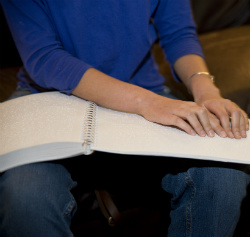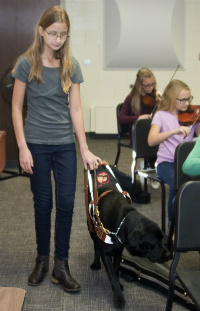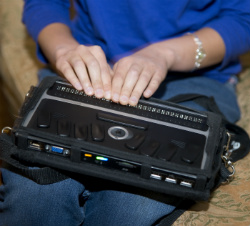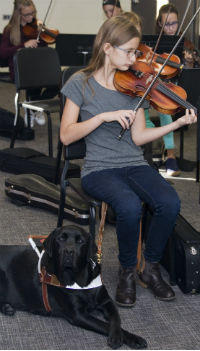Duncan LaGrand is a regular in Joan VanDyke’s algebra class, yet on more than one occasion has been known to not only fall asleep, but snore his way through the entire lesson.
He even drools a little.
But nobody’s kicking him out into the hallway. Because Duncan is Julia LaGrand’s guide dog.
And right now, 12-year-old Julia is riding high, fresh from her win at a national Braille Challenge. She bested hundreds of other visually impaired students from around the U.S. and Canada to snag blue-ribbon honors at a special ceremony this past June in Los Angeles.

While Duncan –- a 2-year-old black Labrador — didn’t have anything to do with her win directly, he’s become an important cog in Julia’s development, increasing her confidence as she makes her way through seventh grade at Grand Rapids Christian Middle School.
It’s there that Julia – with Duncan constantly at her side — takes advantage of a special program whereby she receives services from Nancy Ozinga, one of five teacher consultants employed by the Kent ISD who support visually impaired students.
Ozinga is part of a larger team that has been working with Julia since she was in preschool to hone her skills at reading and writing Braille, and making gains on orientation and mobility.
It paid off a few months ago, when Julia advanced to the finals of the Braille Challenge, the seventh time she’s qualified for the finals. This is the first time, however, that she’s claimed top prize in her division.

Awesome Student, Talented Musician
The daughter of Melissa LaGrand and her husband, State Rep. David LaGrand (D-Grand Rapids), Julia was born with aniridia, characterized by a complete or partial absence of the eye’s iris, and in Julia’s case, compounded by glaucoma and one detached retina. She’s endured multiple surgeries, and is part of a research initiative under way at the University of Pittsburgh, though for now there is no known cure.
Julia has been enrolled in classes for the visually impaired since a tot, and Elizabeth Huisman – an inclusion aide at Julia’s school – has been at her side from the time Julia was 5.
“She’s one awesome student,” says Huisman, “one of the hardest workers I’ve ever known. Her focus is to do everything her peers do, and to the best of her abilities.”
Ozinga echoes the same sentiments, touching on Julia’s character: “She’s a young lady first, and the blindness comes second.”
Despite her impairment, Julia has become practiced at both piano and the violin. She learned the latter through the Suzuki method, first embracing it when she was just 3. She plays in the classical orchestra of the Grand Rapids Youth Symphony, and recently placed second in a concerto competition.
She’s also an accomplished writer and voracious reader, leaning on machines that allow her to convert characters to Braille, a system of raised dots Julia is able to both read with her fingertips and create with those instruments.
At the Braille Challenge in L.A., Julia underwent two days of grueling competition that tested her reading comprehension, speed and accuracy, proofreading, spelling and ability to read tactile charts and graphs. At the awards ceremony, she was crowned tops over nine other finalists competing in her category for fifth- and sixth-graders, dubbed the “sophomore division.”

Only She Speaks to Duncan
To say that winning a national award has gone to her head would be a complete misnomer. She’s still the humble student who moves through the hallways with Duncan without trying to draw more attention to herself than already occurs naturally, often engaging in conversation with a couple of best friends, Renee and Naomi.
But wholesale conversations never extend to Duncan. That’s a role reserved for Julia alone. In fact, after securing Duncan this past summer, Julia arranged to address the entire school faculty before classes got under way. She informed them that tough as it might be, people weren’t supposed to pet, speak to, or even make eye contact with her guide dog.
The staff passed that gentle edict on to students, most of whom comply — although there have been a few miscues. Julia giggles to recall how one classmate sighed and told her indramatic fashion that “Every time I see that dog, I just die inside!”
Another related how it would be easier to leave Duncan be “if it were an ugly mutt!”
Julia doesn’t make any apologies for the restrictions, and Ozinga and Huisman concur: “It’s a formula that works, and part of their bonding piece,” says Ozinga.
At the LaGrand home, located in Heritage Hill, Jupiter has his own problems with Duncan. That’s the Goldendoodle who laid claim to the household before Duncan arrived, and is technically Julia’s dog as well, which means she has to shower both of them with equal love.
“When Duncan first came to live with us,” recalled Julia, “Jupiter would come up and lean on us very melodramatically, like ‘This is the worst thing in the world!’
“He would bark and growl at Duncan in the beginning, but it’s gotten a little better.” Still, in Julia’s words, “Duncan will try to be friendly and nice, but Jupiter will have nothing to do with Duncan.”

‘I Can See Her Being President’
Duncan was trained by the nonprofit Mira Foundation in Quebec, the only agency worldwide that will supply service dogs to those younger than 16. As part of the training process, Julia spent two months in Quebec after the Braille competition, learning, among other things, how to administer Duncan’s commands in French. The only exception are directives to go “right” and “left,” which are vocalized by saying “gee” and “haw” respectively, utilized in an international way for centuries by people piloting draft animals and sled dogs.
It’s safe to say that Duncan will be a part of Julia’s life for as long as he’s able to serve. And that Julia will continue to soar, not only at Braille, but as she makes her way in a world that’s not always kind in accommodating people with special needs.
Julia’s mother points out that most of Julia’s obstacles are actually tied to “other people’s perceptions” of what her daughter can and cannot do.
“People can’t imagine functioning without their sight,” says Melissa, “and so they assume that if they couldn’t do anything, then Julia must not be able to do anything.”
She laughs kindly: “People who know her well, know better.”
Ozinga certainly concurs: “I’m excited for Julia’s future,” she says, “because I can see her being president, or certainly following in her dad’s footsteps as a state representative – anything she wants.
“For Julia, there simply are no limits.”










